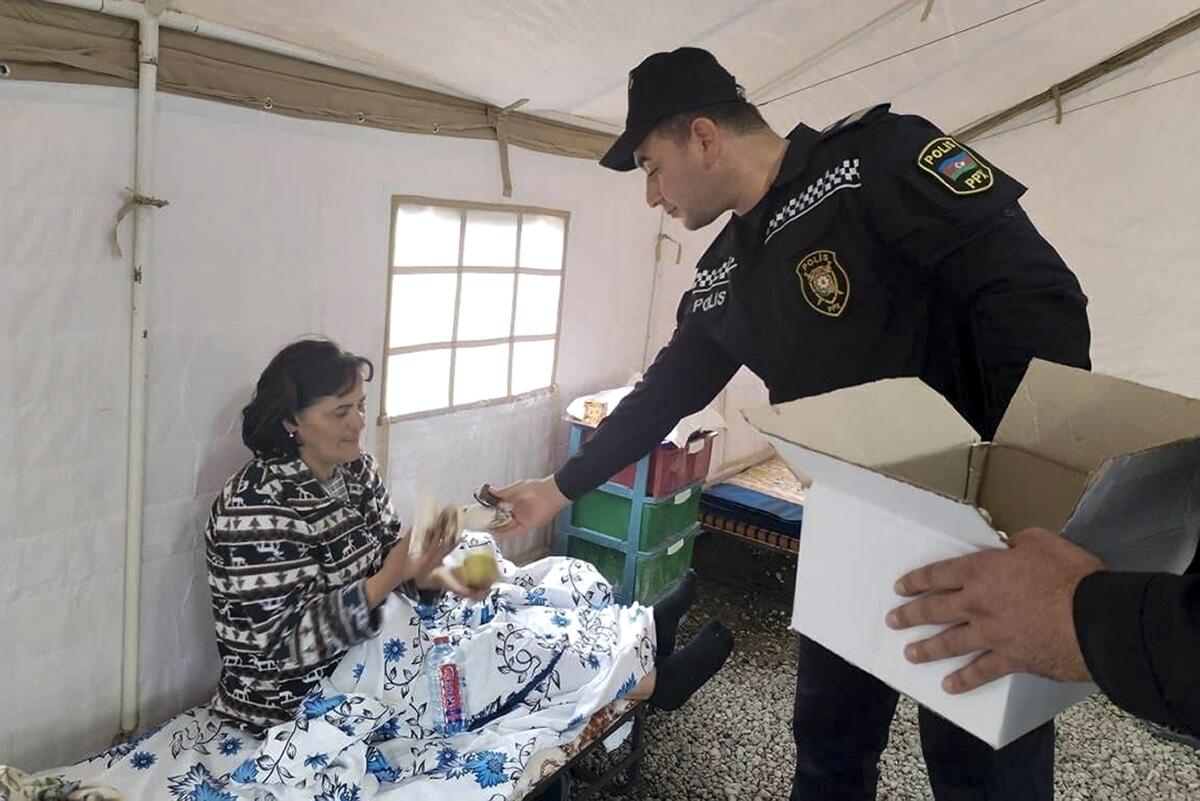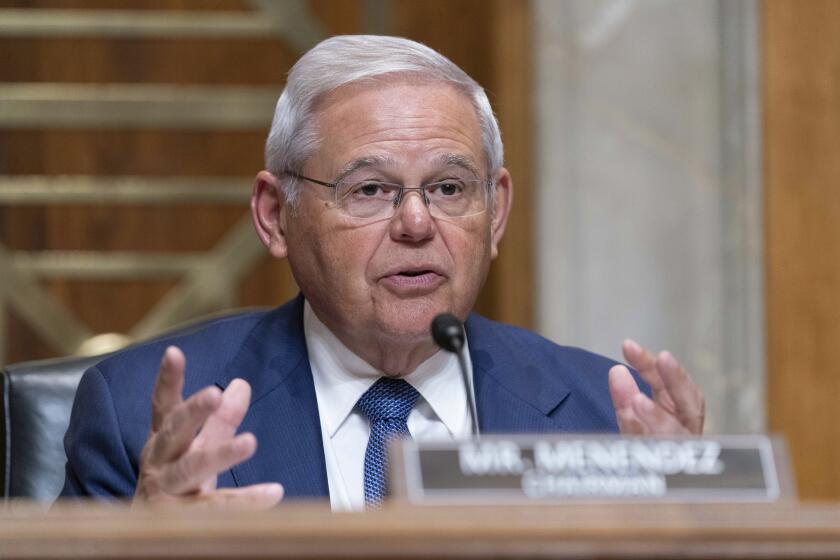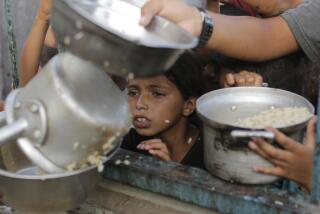Aid is on the way as Azerbaijan reasserts control over Nagorno-Karabakh

- Share via
LONDON — More badly needed humanitarian aid was on its way to the separatist region of Nagorno-Karabakh via Azerbaijan and Armenia on Saturday. The development came days after Azerbaijan reclaimed control of the province and began talks with representatives of its ethnic Armenian population on reintegrating the area, prompting some residents to flee their homes for fear of reprisals.
The aid shipments and evacuations followed Azerbaijan’s months-long road blockade of the region that led to food and fuel shortages, and Azerbaijan’s subsequent lightning military offensive last week.
Nagorno-Karabakh, also known as Artsakh, came under the control of ethnic Armenian forces backed by the Armenian military in separatist fighting that ended in 1994. Armenian forces also took control of substantial territory around the Azerbaijani region.
Azerbaijan regained control of the surrounding territory in a six-week war with Armenia in 2020. A Russia-brokered armistice ended the war, and a contingent of 2,000 Russian peacekeepers was sent to the region to monitor it.
A cease-fire was announced in Nagorno-Karabakh on Wednesday, just a day after Azerbaijan launched heavy artillery fire against ethnic Armenian forces, toning down fears of a third full-scale war over the region.
Sen. Robert Menendez’s defense against federal corruption charges against him shows he’s adopting the same defiant stance he took about older accusations.
Under the agreement mediated by Russian peacekeeping forces, Nagorno-Karabakh’s separatist authorities made sizable concessions: disbanding the region’s defense forces and withdrawing Armenia’s military contingent.
The question of Nagorno-Karabakh’s final status remains open, and the issue is at the center of talks that began Thursday in the Azerbaijani city of Yevlakh.
Russia’s RIA Novosti on Saturday published photos of tanks, air defense systems and other weapons reportedly surrendered by the province’s separatist forces to the Azerbaijani army.
Hundreds of ethnic Armenians evacuated by Russian peacekeepers from Nagorno-Karabakh after the offensive were filmed Saturday camping outside an airport near the Russian peacekeepers’ base by Artsakh TV, a broadcaster based in Nagorno-Karabakh named after ethnic Armenians’ preferred term for the region. Azerbaijan’s government in Baku, the capital, termed the offensive an “anti-terrorist operation.”
Elena Yeremyan, from the village of Askeran, told Artsakh TV that she and her family “had no intention of leaving” the area, as they “didn’t feel safe anywhere” after Azerbaijani troops moved into the region.
Valeri Hayrapetyan from Haterk said that he and his neighbors scrambled to leave after Azerbaijani forces entered the village.
“People left as they could. Someone even left without any clothes. They couldn’t take anything. There are people who haven’t eaten anything. Someone lost consciousness yesterday because of starvation,” he said.
A third evacuee, also from Haterk, claimed that Azerbaijani troops were not allowing young men to leave. Romela Avanesyan also referenced rumors that they might be imprisoned, but did not provide specifics.
The evacuees’ claims could not be independently verified.
U.S. State Department spokesperson Matthew Miller said in a statement Saturday that Secretary of State Antony J. Blinken spoke with Armenia’s Prime Minister Nikol Pashinyan about Azerbaijan’s military actions in Nagorno-Karabakh and reaffirmed U.S. support for Armenia’s sovereignty, independence and territorial integrity.
“The secretary expressed the United States’ deep concern for the ethnic Armenian population in Nagorno-Karabakh,” he said. “He underscored the United States is calling on Azerbaijan to protect civilians and uphold its obligations to respect the human rights and fundamental freedoms of the residents of Nagorno-Karabakh and to ensure its forces comply with international humanitarian law.”
Azerbaijan’s Foreign Minister Jeyhun Bayramov on Friday reaffirmed Baku’s determination to guarantee Nagorno-Karabakh residents “all rights and freedoms” in line with the country’s constitution and international human rights obligations, including safeguards for ethnic minorities.
The office of Azerbaijani President Ilham Aliyev said Saturday that Baku had set up a “working group” to provide Nagorno-Karabakh’s residents with medical care, food and other staples.
Azerbaijani authorities reported Saturday that they shipped more than 60 tons of fuel that same day through the South Caucasus country’s territory.
The International Committee of the Red Cross also said Saturday that it had dispatched 70 tons of humanitarian aid, mostly flour, to Nagorno-Karabakh via the so-called Lachin Corridor, the region’s only road connection to Azerbaijan’s neighbor Armenia. Russian peacekeepers were supposed to ensure free movement along the route, but Baku imposed a blockade in December alleging that Yerevan was using the road for mineral extraction and illicit weapons shipments to the province’s separatist forces.
Armenia contended that the closure denied basic food and fuel supplies to Nagorno-Karabakh’s approximately 120,000 people. Azerbaijan rejected the accusation, arguing that the region could receive supplies through Aghdam — a solution long resisted by Nagorno-Karabakh authorities, who called it a strategy for Baku to take control of the region.
Russia’s Defense Ministry said last week that it has enabled aid deliveries along the Lachin Corridor.
Moscow has also sent more than 50 tons of food aid and other “basic necessities” to Nagorno-Karabakh, RIA Novosti reported Saturday. The Russian Defense Ministry that same day published a video showing Russian peacekeepers stationed in the region unloading the cargo.
Aliyev said Saturday through his press office that “better opportunities” had emerged to seek a peace agreement with Armenia
after 30 years of conflict, largely centered on Nagorno-Karabakh’s status.
But Armenian Foreign Minister Ararat Mirzoyan, at an emergency meeting Friday of the United Nations Security Council called to address the situation in the region, accused Baku of launching an “unprovoked and well-planned military attack” on the province.
Meanwhile, protesters rallied again Saturday in Armenia’s major cities, demanding that authorities defend ethnic Armenians in Nagorno-Karabakh and calling for the resignation of Pashinyan.
Armenia’s Investigative Committee said it had opened 49 criminal cases against demonstrators accused of calling for mass disorder, vandalism and carrying unlicensed weapons.
The Armenian police also told Russia’s Interfax agency Friday that it had arrested 98 protesters at a rally in the country’s capital, Yerevan.
More to Read
Sign up for Essential California
The most important California stories and recommendations in your inbox every morning.
You may occasionally receive promotional content from the Los Angeles Times.











